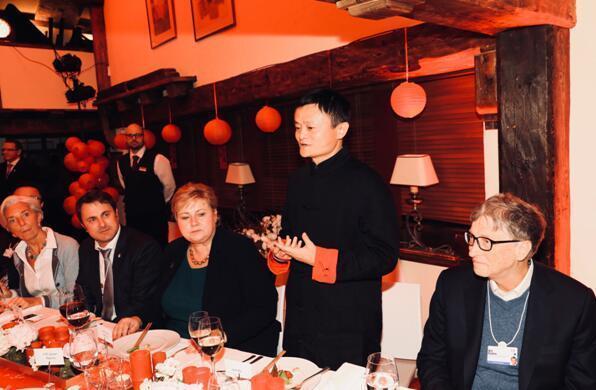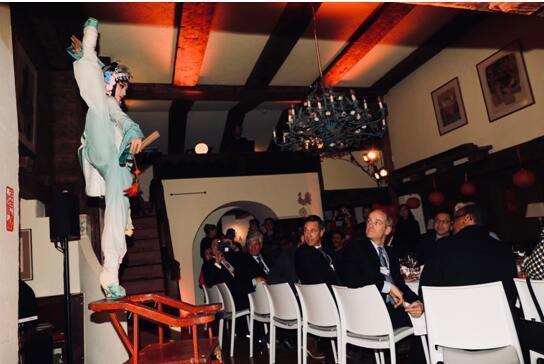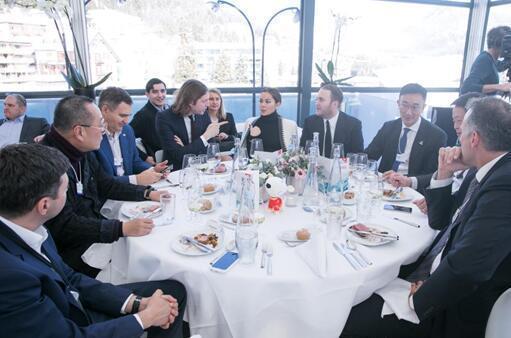Jan.25 (NBD) -- The World Economic Forum's 48th Annual Meeting, which takes place on 23-26 January, 2018 in Davos-Klosters, Switzerland, brings together a record number of attendees. Donald Trump is the first sitting US president to the Davos conference since 2000.
This year also sees more Chinese enterprises participating in this meeting.
Jack Ma's Davos private dinner features Chinese culture
On January 23, Alibaba Group founder Jack Ma held a private dinner at a luxury hotel near the forum venue.
Guests presented included Jordan King Abdullah II, Norway Prime Minister Erna Solberg, Canadian Prime Minister Pierre Trudeau, Managing Director of the International Monetary Fund Christine Lagarde, Microsoft founder Bill Gates, and the list goes on and on.

Ma presented the dinner party in a traditional suit. Different from the dinners held in 2016 and 2017, Ma was more eager to promote Chinese culture to world leaders this time. The background of the party was decorated in "Chinese Red", and performances like drum dance of Miao people, Erhu and traditional operas were presented.
Ma also played a magic with Rwanda president Paul Kagame for other guests.

Richard Liu's private Davos dinner party
Unlike Jack Ma, this is the first time for Richard Liu to attend the World Economic Forum. He hosted a private dinner party at Hard Rock Hotel, bringing together over 40 company heads and academic elites. It's estimated that the total market value of those companies would surpass 2 trillion U.S. dollars.
It's noteworthy that Liu delivered a speech in English with a local accent at the party, narrating his success in setting up JD.com.

Photo/provided by JD
Increasing global influence of Chinese e-commerce giants
The private Davos dinner parties demonstrated the increasing global influence of Chinese e-commerce giants. E-commerce started early in China, and is developing to cover more places.
Bai Ming, deputy director of the Institute of International Market Research of the Chinese Academy of International Trade and Economic Cooperation, said the development of e-commerce in western countries is relatively slower because they have many giant local retailers.
In the past year, Chinese e-commerce giants have made remarkable headways in their global expansion. Cross-border e-commerce would be another opportunity ahead.
Alibaba's global expansion
To expand globally, e-commerce giants first have to let local customers accept their culture. That's why Jack Ma highlighted Chinese traditional culture at his Davos dinner, Bai explained.
Jack said at this year's World Economic Forum meeting in Davos that his company will enable every young person and small business to buy globally, sell globally, pay globally, deliver globally, and travel globally.
The Southeast Asian market is an important part of Alibaba's wider global expansion strategy. Thanks to strong sales of Southeast Asia's online shopping platform Lazada and China outbound platform AliExpress, Alibaba reported revenue of 433 million U.S. dollars from the international retailing business in the second quarter of fiscal year 2018, up 115 percent year on year.
The e-commerce titan has implemented a number of e-commerce projects in Southeast Asia, for example, the launch of the first free trade logistics e-HUB in Malaysia, as part of the eWTP project. In addition, the Lazada platform, in which Alibaba holds a stake, even set up a channel named "Best Buys on Taobao", facilitating customers in Singapore, Malaysia, Indonesia, Philippine and Thailand to buy Chinese goods. With regard to the logistic sector, Alibaba invested in Singapore Post.
JD's global expansion
Richard Liu said in his book entitled "my story of setting up startups", his last dream is to globalize JD.com and then retire to take care of his grandsons.
Liu said global expansion of JD.com is to be completed in two steps: first, bring popular foreign goods to China, and second, send popular Chinese goods overseas. He believes that many Chinese brands will go global over the next decade.
In 2017, JD.com did a lot to expand its presence in the logistic, financial and even real estate sectors. Guided by the Belt and Road Initiative, JD.com decided to speed up its global expansion. On June 23 of last year, its share price rose 3.92 percent to 60.9 billion U.S. dollars, more than two times of the previous year.
Most of guests Liu invited are JD.com's business partners. Among them, Chanel and Adidas are its suppliers, the Canadian Pension Fund, HSBC and Standard Charter are financial partners; Deppon Logistics is a logistic solution provider; McKinsey and the Fortune magazine are offering operation experience to JD.com.
NBD noticed that JD.com took Indonesia as its first stop of globalization, and Thailand the second. The company is expected to expand to Vietnam and other Southeast Asian markets in 2018. In addition, it has established a procurement center in Europe to bring more European brands to China.
Email: tanyuhan@nbd.com.cn


 川公网安备 51019002001991号
川公网安备 51019002001991号





